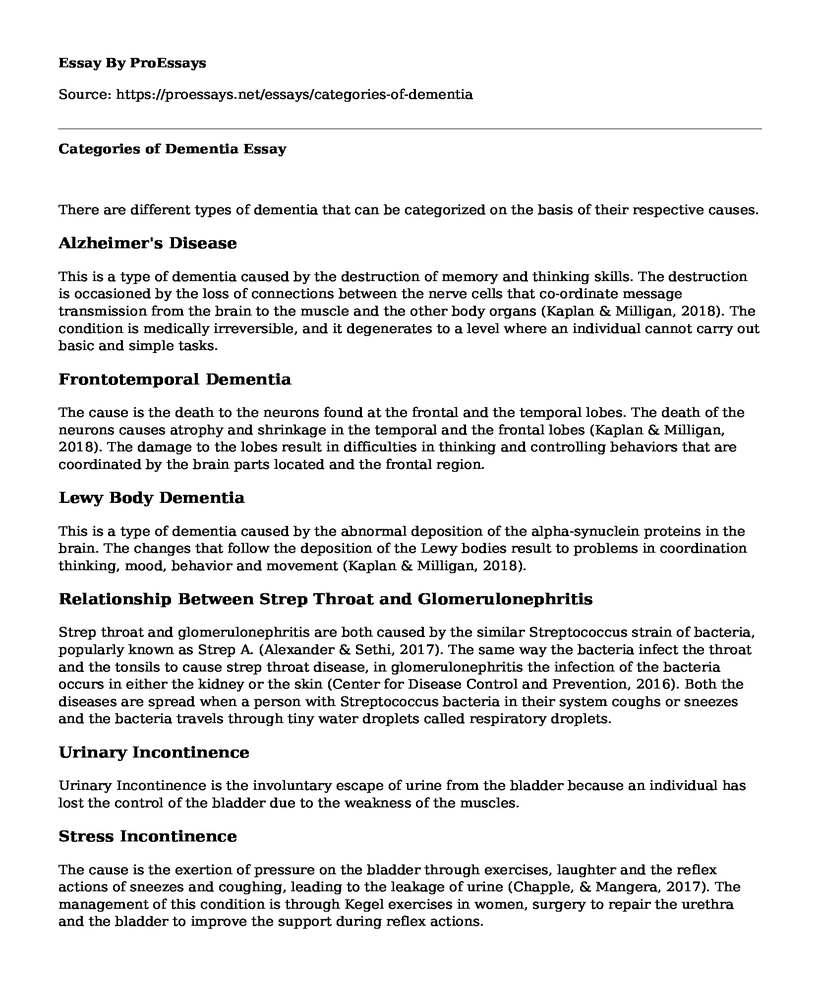There are different types of dementia that can be categorized on the basis of their respective causes.
Alzheimer's Disease
This is a type of dementia caused by the destruction of memory and thinking skills. The destruction is occasioned by the loss of connections between the nerve cells that co-ordinate message transmission from the brain to the muscle and the other body organs (Kaplan & Milligan, 2018). The condition is medically irreversible, and it degenerates to a level where an individual cannot carry out basic and simple tasks.
Frontotemporal Dementia
The cause is the death to the neurons found at the frontal and the temporal lobes. The death of the neurons causes atrophy and shrinkage in the temporal and the frontal lobes (Kaplan & Milligan, 2018). The damage to the lobes result in difficulties in thinking and controlling behaviors that are coordinated by the brain parts located and the frontal region.
Lewy Body Dementia
This is a type of dementia caused by the abnormal deposition of the alpha-synuclein proteins in the brain. The changes that follow the deposition of the Lewy bodies result to problems in coordination thinking, mood, behavior and movement (Kaplan & Milligan, 2018).
Relationship Between Strep Throat and Glomerulonephritis
Strep throat and glomerulonephritis are both caused by the similar Streptococcus strain of bacteria, popularly known as Strep A. (Alexander & Sethi, 2017). The same way the bacteria infect the throat and the tonsils to cause strep throat disease, in glomerulonephritis the infection of the bacteria occurs in either the kidney or the skin (Center for Disease Control and Prevention, 2016). Both the diseases are spread when a person with Streptococcus bacteria in their system coughs or sneezes and the bacteria travels through tiny water droplets called respiratory droplets.
Urinary Incontinence
Urinary Incontinence is the involuntary escape of urine from the bladder because an individual has lost the control of the bladder due to the weakness of the muscles.
Stress Incontinence
The cause is the exertion of pressure on the bladder through exercises, laughter and the reflex actions of sneezes and coughing, leading to the leakage of urine (Chapple, & Mangera, 2017). The management of this condition is through Kegel exercises in women, surgery to repair the urethra and the bladder to improve the support during reflex actions.
Urge Incontinence
This is caused by neurologic disorders and diabetes. It is characterized by the intense desire to pass out urine, but it is followed by an involuntary loss of the urine, forcing one to urinate frequently (MedlinePlus, 2017). Control techniques include the reinforcement of individual behavior (McCance & Huether, 2010). The affected people are urged to visit the washrooms before engaging in strenuous exercises, use of weighted cones to strengthen the bladder and the pelvic muscles, and the control of fluid intake in an individual before exercise or travel to decrease the instances of liquid discharge from the body.
Overflow Incontinence
There is retention of urine in the bladder thus an individual experiences constant dribbling of urine. The causes are enlarged prostate in men that inhibit the easy flow of urine from the bladder (Gomelsky, & Dmochowski, 2011). In women, the blockage of the urethra due to infections, tumors and urinary stones are the primary causes of the overflow incontinence. Weak bladder muscles cause the condition in both genders (McCance, & Huether, 2010). The management is by the administration of the antidepressants and the anticonvulsants that improve the nerve signals to the bladder.
Mixed Incontinence
This is a condition in which an individual experiences more than a single type of incontinence. The individual, therefore, exhibits the symptoms of the different types of urinary incontinence (Ludwig & Stumm, 2016). This mixed incontinence condition is treated by lifestyle modification and subsequent therapy in the pelvic floor muscle.
References
Alexander, M. P., & Sethi, S. (2017). Membranoproliferative Glomerulonephritis, Adult. Glomerulonephritis, 1-16. doi:10.1007/978-3-319-27334-1_22-1.
Chapple, C. R., & Mangera, A. (2017). Stress urinary incontinence. Oxford Medicine Online. doi:10.1093/med/9780199659579.003.0038.
Gomelsky, A., & Dmochowski, R. R. (2011). Treatment of mixed urinary incontinence. Central European Journal of Urology, 64(3), 120-126. http://doi.org/10.5173/ceju.2011.03.art2
Kaplan, T., & Milligan, T. (2018). Dementia 1: Defining Dementia, Alzheimer's Disease and Frontotemporal Dementia (DRAFT). Oxford Medicine Online. doi:10.1093/med/9780190650261.003.0009
Ludwig, S., & Stumm, M. (2016). Surgical Treatment of Urgency Urinary Incontinence, OAB (Wet), Mixed Urinary Incontinence, and Total Incontinence by Cervicosacropexy or Vaginosacropexy. Gynecology & Obstetrics, 6(9). doi:10.4172/2161-0932.1000404
WebMED. (2018). Overflow Incontinence. Retrieved from https://www.webmd.com/urinary-incontinence-oab/overflow-incontinence#McCance, K. A. & Huether, S.E. (2010). Pathophysiology: The biologic basis for disease in adults and children (7th ed.). St. Louis: Mosby.
Center for Disease Control and Prevention. (2016, September 16). Group A Strep | Post-Streptococcal Glomerulonephritis | | PSGN | GAS | CDC. Retrieved from https://www.cdc.gov/groupastrep/diseases-public/post-streptococcal.html
MedlinePlus. (2017, August 26). Urge incontinence: MedlinePlus Medical Encyclopedia. Retrieved from https://medlineplus.gov/ency/article/001270.htm
National Institute on Aging. (2018, June 27). What Is Lewy Body Dementia? Retrieved from https://www.nia.nih.gov/health/what-lewy-body-dementia
Cite this page
Categories of Dementia. (2022, Feb 28). Retrieved from https://proessays.net/essays/categories-of-dementia
If you are the original author of this essay and no longer wish to have it published on the ProEssays website, please click below to request its removal:
- Report Example on Food Processing Plant Hygiene
- Paper Example on Organ Transplantation
- Paper Example on Teaching Nursing Education
- Research Paper on Shoulder Complexity & Injury: Aching Pain & High Flexibility
- Essay Example on Professional Nursing: Caring for All
- Social Work Prof: Aims to Improve Lives & Create Opportunities - Essay Sample
- Essay Sample on COVID-19: Impact on Supply Chain Management & Strategies for Recovery







